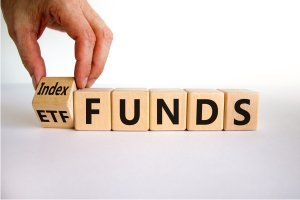
Whether you are building a home, a garden, or a portfolio, you may face multiple choices. A clear understanding of the features and differences can help you pick the right option. For instance, in the case of passive investment funds, the two popular alternatives, Exchange Traded Funds (ETFs) and index mutual funds, can be good additions to your portfolio. However, before you go ahead and pick one, here are some things to know about them.
ETF vs index funds – Meaning
ETFs are a basket of multiple securities like stocks, bonds, derivatives, etc. that are traded on the stock exchange. They follow a benchmark and replicate its performance. They are the perfect blend of a mutual fund and a stock. They pool money from several investors like other mutual funds but are listed on exchanges and traded like stocks. Also, you need a Demat account to invest in ETFs.
Index funds are a type of mutual fund scheme that too follows an index and aims to mimic its performance. They are managed by a fund manager. However, the manager does not actively buy and sell securities to earn returns. Instead, they invest in the same stocks as the underlying index that the fund follows.
ETF vs index funds – Differences
Here are some differences between the two:
Trading style
The primary difference between the two lies in the way they are bought and sold. ETFs are traded on the stock exchange like individual stocks throughout the day. On the other hand, you can buy or sell index funds at the price published at the end of the trading day. However, this should not be a concern for you if you are a long-term investor.
Need for a Demat account
You need a Demat account for ETFs, whereas index funds do not have this prerequisite. You can invest in an index fund through the Asset Management Company (AMC) or a broker.
Option to choose a Systematic Investment Plan (SIP)
SIPs allow you to invest a chosen amount at a preferred frequency and term in a mutual fund scheme of your liking. ETFs generally do not offer SIP options. Contrarily, index funds enable you to invest through SIPs which can be suitable for a long-term investment.
Taxation:
Equity ETFs and index funds are taxed in the following way:
- Dividends: Post the abolishment of the Dividend Distribution Tax (DDT) in FY 2020-21, dividends are added to your income and taxed accordingly.
- Capital gains: Gains are taxed as short-term capital gains (STCG) or long-term capital gains (LTCG). LTCGs up to Rs. 1 lakh/year are not taxed. Gains over Rs. 1 Lakh/year are taxed at 10%. On the other hand, STCGs are taxed at 15%.
For debt ETFs and other ETFs, LTCGs are taxed at 20% with indexation benefit, and STCGs are taxed as per your income tax slab.
Note: The holding period for STCG is up to one year for equity funds and up to three years for debt funds. The holding period for LTCG is more than one year for equity funds and over three years for debt funds.
Conclusion
Now that you know the differences between ETFs and index funds, you can use an investment calculator and start planning your investment in both or either of the two based on your goals.
An investor education initiative by Edelweiss Mutual Fund
All Mutual Fund Investors have to go through a one-time KYC process. Investors should deal only with Registered Mutual Fund (RMF). For more info on KYC, RMF and procedure to lodge/redress any complaints, visit - https://www.edelweissmf.com/kyc-norms
MUTUAL FUND INVESTMENTS ARE SUBJECT TO MARKET RISKS. READ ALL SCHEME-RELATED DOCUMENTS CAREFULLY
Trending Articles
MUTUAL FUND INVESTMENTS ARE SUBJECT TO MARKET RISKS, READ ALL SCHEME RELATED DOCUMENTS CAREFULLY.















